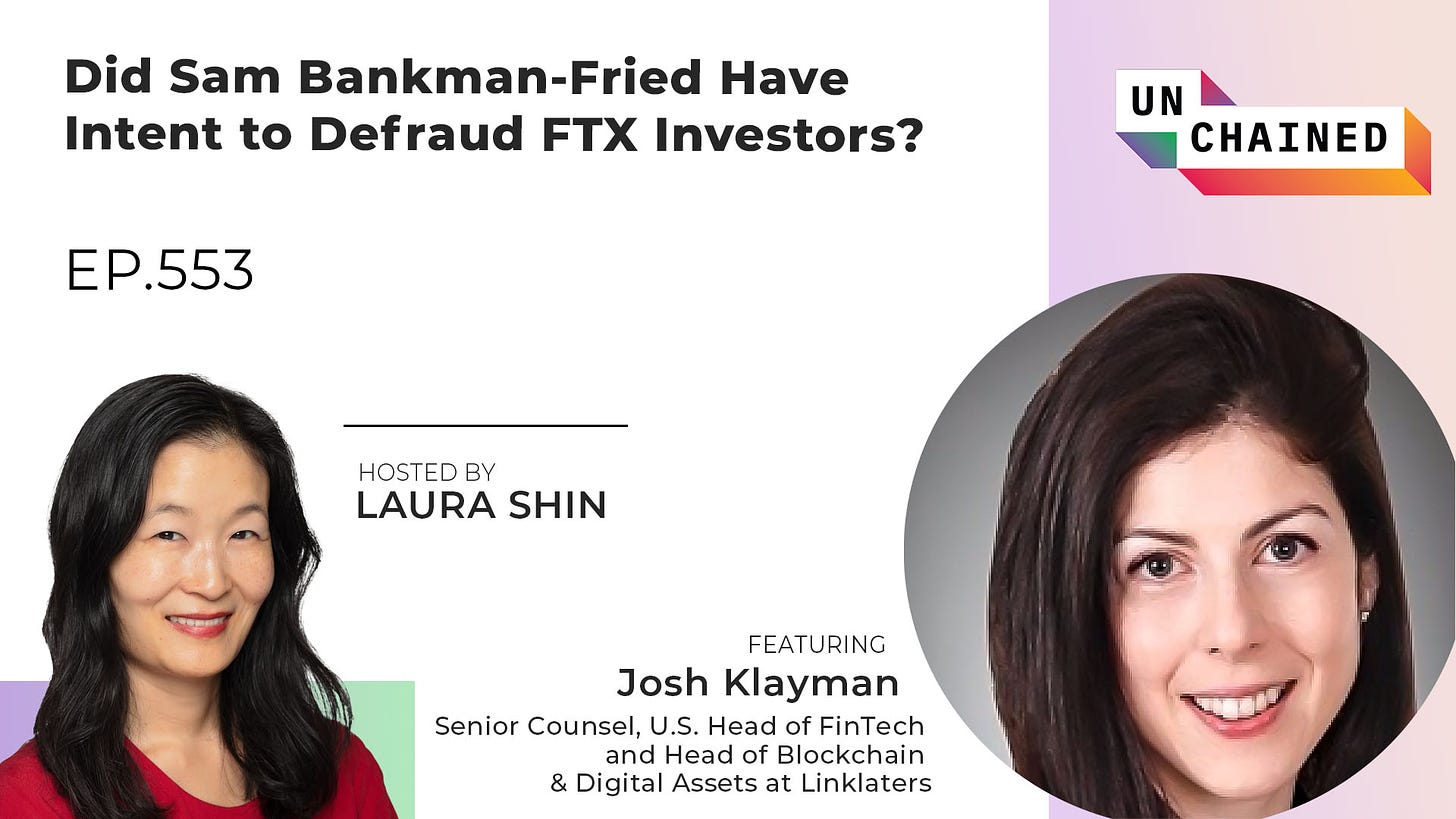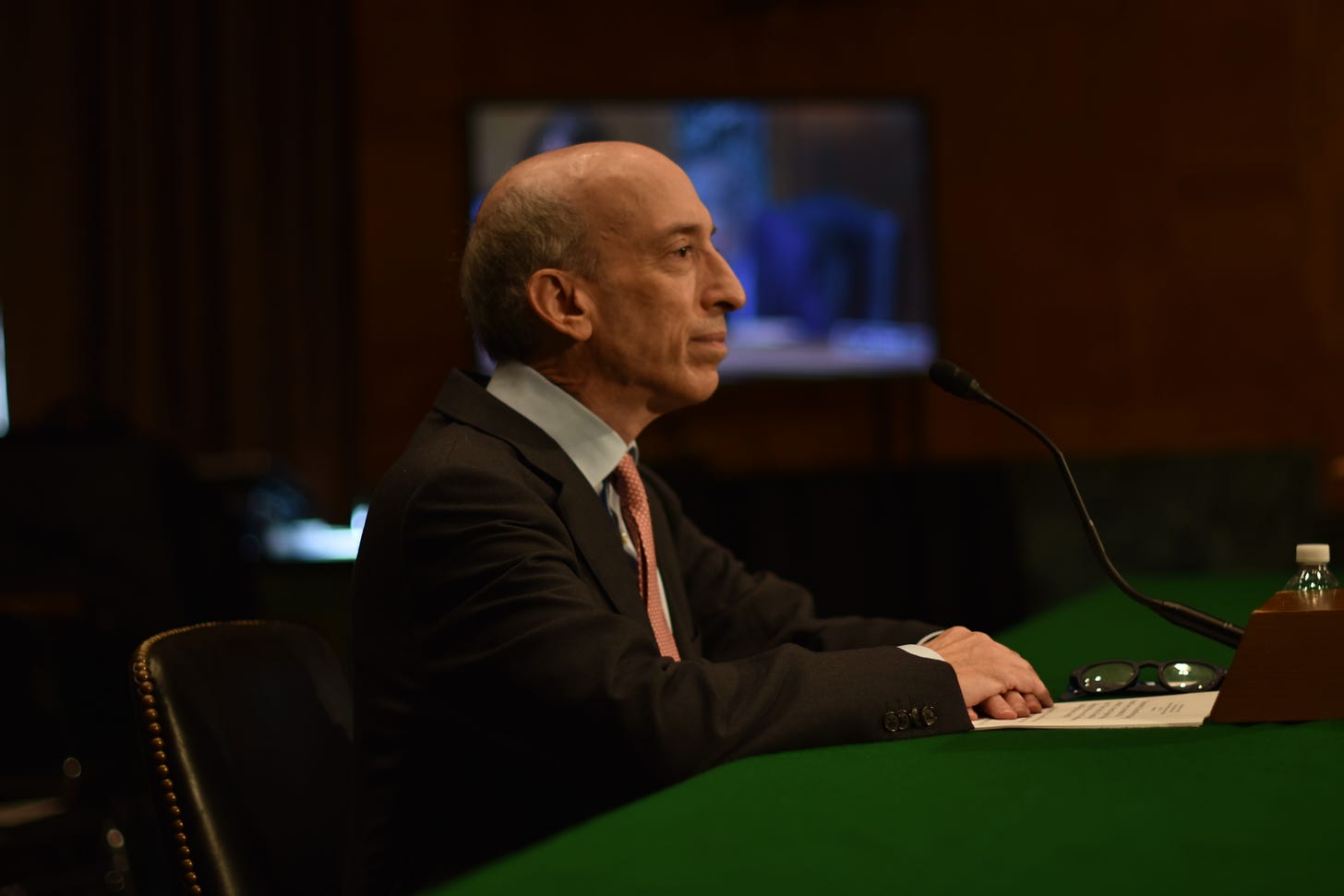Sam Bankman-Fried Trial: Intent or Incompetence? 👨⚖️
Weekly News Recap: 🏛️ Ripple's SEC appeal denied, 💰 Coinbase's legal tussle, ⚖️ Binance's token supply controversy, 📈 Ethereum Futures ETFs debut, and more!
As the trial of Sam Bankman-Fried unfolds, the spotlight is on the prosecution and defense's opening statements and the testimonies of key witnesses.
Josh Klayman, Senior Counsel at Linklaters, joins us to dissect the trial's complexities. From the jury's lack of financial background to the opening statements, we delve into the strategies both sides are employing.
"[The prosecution is] trying to show is no matter that it's a highly technical area, the allegations are this is simple fraud," said Josh.
Weekly News Recap
Federal Court Shuts Down SEC's Appeal in Ripple Case
This week, a significant legal development unfolded as a U.S. Federal Judge, Analisa Torres, denied the Securities and Exchange Commission's (SEC) appeal against Ripple Labs, the company behind the Ripple blockchain and its respective XRP token. The SEC had sought to overturn an earlier ruling that found Ripple didn’t violate federal securities laws in its sale of XRP to retail customers. In a 14-page decision, Judge Torres wrote that the SEC "failed to meet its burden to show that there were controlling questions of law," thereby quashing the appeal.
The decision appeared to immediately impact the market, with XRP's price surging nearly 6% following the news. However, this is far from an outright win for Ripple. Not only is the XRP cryptocurrency still down 80% since its all-time high in the winter of 2018, but Judge Torres has scheduled a trial for April 23, 2024, to address the remaining issues. This ongoing legal battle began in December 2020 when the SEC filed its initial lawsuit against Ripple, alleging unregistered securities offerings.
The SEC's legal pursuits are not limited to Ripple; they have also targeted other major players in the crypto industry, including Binance and Coinbase, which we’ll talk about next.
Also this week, San Francisco-based Ripple secured a license from Singapore's Monetary Authority to offer regulated digital asset services.
SEC Challenges Coinbase's Motion to Dismiss
In another legal twist, the SEC has urged the U.S. District Court in the Southern District of New York to reject Coinbase's motion to dismiss the ongoing lawsuit against the crypto exchange. The agency chaired by Gary Gensler argues that its original complaint sufficiently establishes that Coinbase operated as a broker through its wallet application and that the crypto assets offered are indeed securities.
Coinbase's legal team contends that the SEC has overstepped its regulatory bounds, a claim the SEC labels as "backwards." The regulator also cited a judgment by Judge Jed Rakoff, which dismissed Terraform Labs' motion against the SEC.
Marissa Tashman Coppel, senior legal counsel for the Blockchain Association, wrote about the issue on social media: "The SEC ignores the realities of Coinbase's staking program and focuses entirely on a user’s expectation of profits. This can't be the case." She further explained that Coinbase needs to reply to the SEC's opposition by October 24, and a court decision will follow, which could take some time.
Forbes Alleges Binance Controls Majority of BNB Token Supply
Binance, the world's largest cryptocurrency exchange, is under a new source of scrutiny. A Forbes investigation has raised questions about the company's 2017 Initial Coin Offering (ICO) of its Binance Coin (BNB). Contrary to CEO Changpeng Zhao's claims of raising $15 million, Forbes suggests the ICO might have garnered less than $5 million. The report claims that Binance secretly amassed 65 million BNB tokens. For context, that would be worth only $10 million at the time of the ICO. Now, it’s worth a staggering $14 billion.
Comparing the role BNB plays in Binance’s business model to the role the FTT token played at the defunct FTX, the report also cites forensic analysis that indicates that Binance controls nearly 117 million tokens, or 76% of the total BNB supply, a figure that contradicts both Binance's claims and previous data analytics. At today’s price, that would make Binance’s stash worth about $26.6 billion.
Adam Zarazinski, CEO of Inca Digital, told Forbes: "The dissemination of misleading information...leaves the possibility for Binance to maintain an artificially high BNB price." One person who apparently didn’t speak to Forbes? CZ himself, nor anyone else at Binance, which the Forbes report says did not reply to requests for comment.
Former Celsius CEO Faces Trial, Company Seeks Creditor Repayment
The legal complexities for the crypto industry don’t stop with Binance either. Alex Mashinsky, the former CEO of collapsed lending platform Celsius Network, which filed for bankruptcy last July, is set to stand trial on September 17, 2024. Mashinsky, who resigned following the company's bankruptcy, faces charges including wire fraud and conspiracy to manipulate the value of the native Celsius token. According to a Bloomberg report, Mashinsky’s defense is looking at whether or not a cryptocurrency can be considered a security, given what the lawyers described in a hearing on Tuesday as the fluidity of the law on the matter.
Simultaneously, New York-based Celsius is seeking court approval for a restructuring plan recently approved by stakeholders, that would distribute $2 billion in Ethereum and Bitcoin to creditors by the end of this year. The plan also includes seeding a new creditor-owned entity, NewCo, with $450 million in crypto at least partially provided by a group of stakeholders, collectively known as Farenheit LLC, including Techcrunch founder Michael Arrington. Speaking at a New York bankruptcy hearing Celsius lawyer Christopher S. Koenig sought to frame the effort as more than just stakeholders trying to cover their butts. "Fahrenheit believes in the business,” he said. “They are putting their money where their mouth is."
Michael Lewis Faces Crypto Community Backlash Over FTX Coverage
Michael Lewis, the author of 2010 best seller, The Big Short, faced a wave of criticism from the crypto community following a "60 Minutes" interview about his latest book, about, of course, FTX. The interview served as a media kickoff for the book "Going Infinite," which many believe portrays Sam Bankman-Fried, the imprisoned founder of the now-bankrupt FTX exchange, in a favorable light. "Lewis has essentially become persona non grata within the world of crypto," said Daniel Kuhn in a Coindesk article, questioning the veteran author's role in the FTX saga. Coindesk published the article that is widely credited with helping bring down the exchange.
Among the controversial claims in Lewis' book, Jump Trading, a major market maker, lost $206 million in the FTX collapse. Lewis writes that the source of this information is private documents from former FTX COO Constance Wang.

Among the more shocking claims in the book, Lewis writes that Sam Bankman-Fried was considering paying former US President Donald Trump to not run for President in the upcoming elections. What’s shocking isn’t that SBF was politically active—we know he gave at least $40 million to both Republicans and Democrats—what’s wild is the amount. Lewis claims SBF was mulling a $5 billion payoff to the former President.
There’s already at least one company denying some of Lewis’ claims. A spokesperson for New York market-maker Virtu Financial, which was last month sued by the SEC for failing to protect investor information, denied Lewis’ claims that the firm lost $10 million with the downfall of FTX, in a Block report, or any money at all.
Ethereum Futures ETFs Launch with Modest Volume
This week, the U.S. market saw the debut of nine Ethereum Futures ETFs, but the trading volumes were less than stellar. On their first day, the ETFs, which let investors bet against ether, but don’t directly track the price of the cryptocurrency, recorded a combined trading volume of just $2 million. Bloomberg ETF analyst Eric Balchunas called the volumes "pretty average," noting it's too early to declare a winner among issuers. Valkyrie's BTF led the pack with $882,000 in trading volume—though that’s perhaps not an apples-to-apples comparison, since it also trades bitcoin futures—followed by VanEck's EFUT at $312,000. For some perspective here, ProShares' Bitcoin Strategy ETF saw $1 billion in trading volume on its first day last year.

Adding to the Ethereum ETF landscape, Grayscale Investments has filed an application to convert its Ethereum Trust into a spot Ethereum ETF that would directly track the price of ether. Grayscale CEO Michael Sonnenshein said in a statement: "As we file to convert ETHE to an ETF, we recognize this as an important moment to bring Ethereum even further into the U.S. regulatory perimeter."
Speaking of ETFs, Martin Bednall, a former BlackRock executive, said the SEC will approve all spot bitcoin ETFs simultaneously to avoid giving any firm a first-mover advantage at the CCData Digital Asset Summit this week. Steven Schoenfeld, CEO at VanEck-owned MarketVector Indexes, concurred, suggesting approvals could happen within the next 3 to 6 months. Both believe this will be a significant positive catalyst for the crypto markets.
FTX Exploiter Resurfaces, Moves Millions in ETH
An unknown group or individual allegedly behind an FTX hack that occurred during last year’s collapse of the exchange has reemerged, moving a total of $17 million worth of ether (ETH) to multiple addresses. This marks the first activity from the exploiter's wallet since the hack in November last year. The funds were divided and sent to blockchain token bridge Thorchain and privacy tool Railgun.
Interestingly, the movement of these funds happened just hours before the start of the criminal trial against FTX founder Sam Bankman-Fried.
Vitalik Buterin Sounds Alarm on Ethereum Staking Pool Risks
In one of Vitalik Buterin’s monthly blog posts, the Ethereum creator warned of centralization risks in major staking pools Lido and Rocket Pool. Buterin criticized Lido's DAO governance and Rocket Pool's 8 ETH deposit requirement for node operators, writing somewhat ambiguously: "One layer of defense may not be enough." He urged ecosystem participants to diversify staking pool operators to mitigate system risks. He was perhaps alluding to the seemingly monthly thefts from poorly secured decentralized protocols, but didn’t go into much detail.
What he did elaborate on though was his reluctance to add more features to Ethereum's core protocol, what has somewhat derisively become known as “protocol enshrinement.” Buterin explained the reasoning behind the sparse original coadbase and cautioned that while new features could reduce centralization, they could also strain governance.









